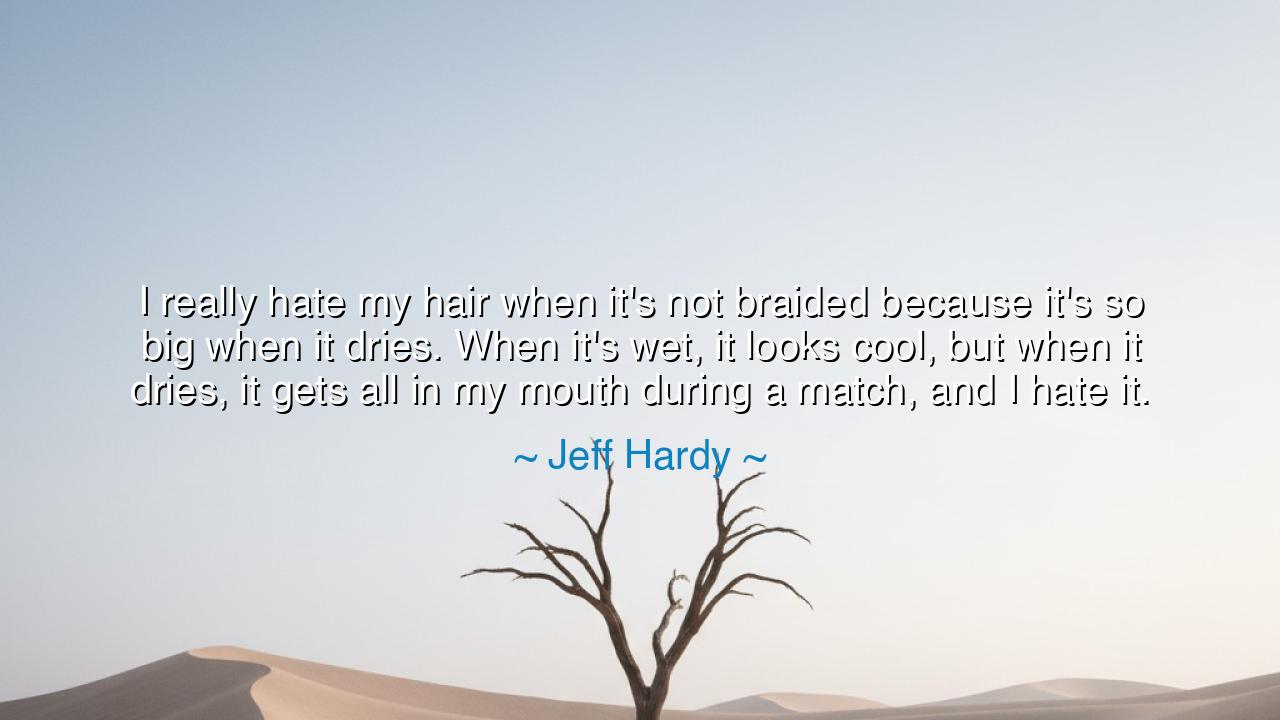
I really hate my hair when it's not braided because it's so big
I really hate my hair when it's not braided because it's so big when it dries. When it's wet, it looks cool, but when it dries, it gets all in my mouth during a match, and I hate it.






"I really hate my hair when it's not braided because it's so big when it dries. When it's wet, it looks cool, but when it dries, it gets all in my mouth during a match, and I hate it." These words from Jeff Hardy offer a rare glimpse into the reality behind the glamour and performance of the world of professional wrestling. On the surface, this may seem like a simple, almost trivial complaint about hair, yet it speaks to a deeper truth that transcends mere appearance—about the struggle between self-expression and practicality, and the challenges that even those who appear larger than life must face. Hardy's frustration with his unruly hair is not just about vanity, but about control and the balance between personal identity and the demands of a high-performance life.
In ancient times, warriors and leaders understood the significance of appearance and its practical implications in battle. The Spartans, for example, were known not only for their discipline and strength but for their ritualistic attention to their appearance. The warrior’s hair and armor were symbols of their identity, but also crucial to their functionality in combat. Long hair, such as that worn by the Vikings or Samurai, had practical purposes—keeping it out of the way during a fight or ensuring that it could be quickly braided or tied for ease of movement. The lesson here is that while self-expression is important, it must also be aligned with the practical realities of the world we navigate.
The irony of Jeff Hardy's experience lies in the tension between aesthetic freedom and the practical demands of his work. Wrestling—a performance rooted in athleticism and grueling physicality—demands that every part of the body be in optimal condition and function. The frustration with his hair becoming a hindrance is a metaphor for the constant balancing act between maintaining personal identity and adapting to the physical constraints that life, or a profession, might impose. Just as the ancient gladiators had to balance their own self-expression with the rigorous demands of the arena, Hardy’s struggle is rooted in a similar conflict.
Take the example of the greatest warriors of the ancient world—Alexander the Great, who wore his hair long to symbolize his warrior spirit, and Joan of Arc, whose simple garb reflected a sense of purpose and clarity. Both figures embodied the complex intersection between identity, practicality, and purpose. For Alexander, his hair symbolized his commitment to his people and his cause. But his battle was not about hair, just as Hardy’s battle is not about appearance; it is about focus and performance—ensuring that nothing distracts from the larger mission at hand. Just as Joan of Arc had to fight in an environment that required her to balance her identity with the harsh demands of war, Hardy must adapt his self-expression to fit the intensity of his matches.
The lesson here is one of adaptation. It reminds us that while personal expression is valuable, it must be adjusted to suit the needs of our life’s path. This is not to say that one must abandon individuality, but rather that one must be mindful of the context in which they exist. Like a warrior, we must learn to prioritize the immediate goals at hand—be it in battle, in life, or in a profession—while still honoring our own sense of self. Hardy’s frustration with his hair, when seen through this lens, becomes an example of how even the most seemingly insignificant details—such as hair—can impact our performance and focus.
In the modern world, we often face a similar tension between aesthetic desires and practical needs. Think of artists who struggle with their personal identity as it relates to their work. The fashion industry, for example, can sometimes demand that designers suppress their creative freedom in favor of mass-market appeal. But the true mastery of these creative individuals lies in their ability to adapt their vision to the practical realities of the world, just as Hardy adapts his look to ensure that his athleticism takes precedence in the ring. Creativity and functionality must find balance in every field, from art to sport to leadership.
Ultimately, the practical wisdom we can glean from Jeff Hardy's experience is this: flexibility is essential in both personal identity and performance. Self-expression is important, but it must also align with the needs of the moment. Just as ancient warriors adapted their appearance for battle, so must we learn to adapt our identity to fit the demands of our journey. Hardy’s frustration with his hair is a reminder that we should all consider the balance between who we are and what is required of us, understanding that our personal expressions should serve our greater purpose without hindering our performance. Adaptation and awareness are the keys to success in any endeavor.






AAdministratorAdministrator
Welcome, honored guests. Please leave a comment, we will respond soon